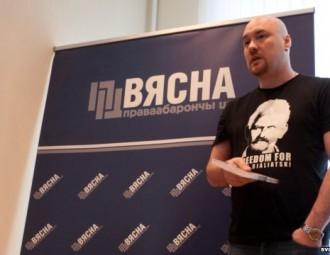Valiantsin Stefanovich against Attorney General: sinuosity of “Viasna”

On February 18 the Court of Minsk’s Tsentralny district considered a complaint, appealing against a decision of the Prosecutor General’s Office to restrict access to the website spring96.org site.
A complaint against blacklisting spring96.org was filed by Valiantsin Stefanovich, deputy chairman of the Human Rights Center "Viasna".
However, Viasna failed to protect its website in court. The case was tried by Judge Alena Siamak of the Tsentralny District Court of Minsk, who previously considered the case of a travel ban imposed on a number of Belarusian human rights defenders.
Valiantsin Stefanovich received a reply to his appeal to the Prosecutor General of Belarus dated December 10, 2013, which dealt with blacklisting www.spring96.org site, the press service of the Human Rights Centre “Viasna” reports. In particular, the response states that actions on behalf of the human rights organization "Viasna" that has not passed the established procedures of state registration are contrary to the law of the Republic of Belarus. In addition, Article 193.1 of the Criminal Code provides for criminal liability for organizing or participating in the activities of political parties, other public associations, religious organizations or foundations that have not received state registration in the prescribed manner.
The General Prosecutor's Office further argues that, “due to the fact that the internet resource www.spring96.org has for a long time posted information that promotes acts prohibited by law, the General Prosecutor's Office in August 2011 ordered to add the identifier for this internet resource to the list of restricted access, which was forwarded to RUE "BelGIE" for execution.”
At the beginning of the trial, Valiantsin Stefanovich requested to allow chairman of the Belarusian Helsinki Committee Aleh Hulak contribute to proceedings. He also asked to announce the decision of the Prosecutor General, on the basis of which the spring96.org website was blacklisted. Stefanovich also asked the Judge to conduct proceedings in the Belarusian language. The Judge and the prosecutor supported the petitions, except the last one.
At the hearing, Pavel Eliseeu, the representative of prosecuting authorities, said that if the Prosecutor's Office had the ability to impose general restrictions on access to the website of the HRC "Viasna", the law enforcement agency would have implemented it. "So far we have used the mechanism allows by the law - restricting access for government agencies, institutions of culture and education."
During debates, Stefanovich said that the representative of the Prosecutor General’s Office failed to explain what rights of citizens were violated through information that the applicant disseminated on spring96.org. "Our business is based on the principles of human rights. We support public policies to combat extremism, violence, ethnic, racial and other discrimination. I insist that the information that we disseminate in no way breaks the law. And the prosecutors did not provide any counterarguments,” says Viasna deputy chairman.
As a result, the court ruled to find Valiantsin Stefanovich improper plaintiff, because he is not the owner of the website spring96.org, and blacklisting the website did not violate his personal rights. In addition, the judge ruled to discontinue proceedings in the civil case. Valiantsin Stefanovich is not entitled to appealing the decision in cassation and supervisory procedures, but may file a private complaint within 10 days.
The human rights defender previously stated that he intended to appeal against the illegal decision at the international level, the UN Human Rights Committee, having exhausted all domestic remedies.
Earlier, in the comment to the EuroBelarus Information Service Valiantsin Stefanovich considered it to be a threat at all the members of HRC “Viasna”.
“We believe this reply to be a threat at all the members of the HRC “Viasna”, as the letter notes that the activity on behalf of an unregistered organization is criminally liable under Article 193.1 of the Criminal Code.
In this regard we have adopted a statement, which says that the activities of the Human Rights Center "Viasna" in Belarus are completely legitimate.
As to the criminal liability for the organization's activities without state registration provided by Art. 193.1 of the Criminal Code, it has unconstitutional nature and lacks conformity with international standards of human rights. A respective assessment of Art. 193.1 of the Criminal Code was also given by an expert legal opinion of the European Commission for Democracy through Law (Venice Commission of the Council of Europe)”.
The human rights fighter is convinced that restricting the rights and freedoms of individuals is allowed only in cases prescribed by law, for the sake of national security, public order, morality, health, rights and freedoms of others, and therefore asks the court to find the decision of the General Prosecutor's Office illegal, as it violates the rights of citizens, and to oblige the authority to correct the violations.
-
03.01
-
07.10
-
22.09
-
17.08
-
12.08
-
30.09



























